| Srl | Item |
| 1 |
ID:
073146
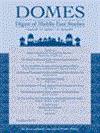

|
|
|
|
|
| Publication |
Hampshire, Ashgate, 2006.
|
| Description |
xvi, 234p.hbk
|
| Standard Number |
0754644812
|
|
|
|
|
|
|
|
|
|
|
|
Copies: C:1/I:0,R:0,Q:0
Circulation
| Accession# | Call# | Current Location | Status | Policy | Location |
| 051501 | 973.931/HUN 051501 | Main | On Shelf | General | |
|
|
|
|
| 2 |
ID:
128693
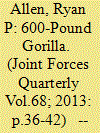

|
|
|
| 3 |
ID:
073411
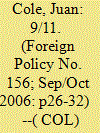

|
|
|
| 4 |
ID:
086999
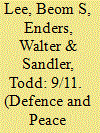

|
|
|
|
|
| Publication |
2009.
|
| Summary/Abstract |
In February 1998, Osama Bin Laden published a signed statement calling for a fatwa against the United States for its having 'declared war against God'. As we now know, the fatwa resulted in the unprecedented attack of 9/11. The issue of whether or not 9/11 was in any way predictable culminated in the public debate between Richard Clarke, former CIA Director George Tenet and the White House. This paper examines whether there was any evidence of a structural change in the terrorism data at or after February 1998 but prior to June 2001, controlling for the possibility of other breaks in earlier periods. In doing so, we use the standard Bai-Perron procedure and our sequential importance sampling (SIS) Markov Chain Monte Carlo (MCMC) method for identifying an unknown number of breaks at unknown dates. We conclude that sophisticated statistical time-series analysis would not have predicted 9/11.
|
|
|
|
|
|
|
|
|
|
|
|
|
|
|
|
| 5 |
ID:
079217
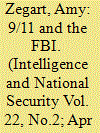

|
|
|
|
|
| Publication |
2007.
|
| Summary/Abstract |
Public discussion about the 11 September 2001 terrorist attacks has focused on the human causes of tragedy - on individual mistakes, failures of leadership, and the power plays between intelligence officers in the field and policymakers in Washington. But closer examination of the FBI suggests that organizational weaknesses are the root cause of poor agency performance. Longstanding deficiencies in the FBI's organizational structure, culture, and incentive systems proved crippling in the 1990s, when the Cold War ended and the terrorist threat emerged. These lingering weaknesses ultimately prevented the bureau from capitalizing on 12 separate opportunities that might have disrupted the 9/11 plot
|
|
|
|
|
|
|
|
|
|
|
|
|
|
|
|
| 6 |
ID:
106380
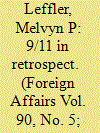

|
|
|
| 7 |
ID:
106597
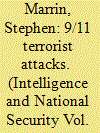

|
|
|
|
|
| Publication |
2011.
|
| Summary/Abstract |
The 9/11 terrorist attacks have been intensively examined as both tactical and strategic intelligence failures but less attention has been paid to the policy failures which preceded them. Perhaps this is due to the presumption that intelligence analysis influences decision-making as a precursor to and foundation for policy. This assumption about the influence of analysis on decision deserves a much closer examination. The 9/11 terrorist attacks provide a good case to study for greater understanding of the influence, or lack of influence, that intelligence analysis has on decision-making. Specifically, the 9/11 Commission Report identifies as a significant failure the lack of a National Intelligence Estimate on the terrorist threat between 1998 and 2001, and implies that if one had been produced it might have helped enable decision-makers to prevent the 9/11 attacks. In other words, a failure of strategic intelligence analysis lay at the foundation of the failure to prevent 9/11. But was this really the case? This article takes a closer look at the case of the missing National Intelligence Estimate by first evaluating what decision-makers knew about the threat prior to the 9/11 attacks, the policies they were implementing at the time, and the extent to which the hypothetical National Intelligence Estimate described by the 9/11 Commission would have mattered in terms of influencing their judgement and policy for the better. It concludes that the 9/11 terrorist attacks were more a failure of policy than strategic intelligence analysis.
|
|
|
|
|
|
|
|
|
|
|
|
|
|
|
|
| 8 |
ID:
105829


|
|
|
|
|
| Publication |
2011.
|
| Summary/Abstract |
The traditionally close relationship between China and Pakistan cooled off somewhat with the end of the Cold War, mainly due to China's efforts to improve its relations with India and the disappearance of the Soviet threat. While China has continued to pursue its rapprochement with India after 9/11, developments since 9/11 have reinforced the security foundations of Sino-Pak relations and have consequently reversed the downward trend in the relationship leading to enhanced cooperation in a number of areas. US involvement in Central Asia and deepening Indo-US collaboration have further increased Pakistan's strategic importance for China. Islamabad also occupies a prominent position in Beijing's energy security and its efforts to stabilize Xinjiang.
|
|
|
|
|
|
|
|
|
|
|
|
|
|
|
|
| 9 |
ID:
073478
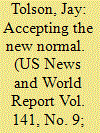

|
|
|
| 10 |
ID:
129880
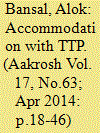

|
|
|
| 11 |
ID:
119129
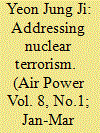

|
|
|
| 12 |
ID:
107147
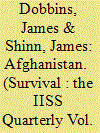

|
|
|
|
|
| Publication |
2011.
|
| Summary/Abstract |
The overarching Western objective in Afghanistan should be to prevent that country from becoming not just a haven for transnational terrorists, but a terrorist ally as well. That was the situation prior to 9/11 and it would be so again if the Taliban returned to power with al-Qaeda backing. NATO can prevent this indefinitely as long as it is willing to commit significant military and economic resources to a counter-insurgency effort. It cannot eliminate the threat, however, as long as the Afghan insurgents enjoy sanctuary in and support from Pakistan. Alternatively, this objective could be achieved if the Taliban could be persuaded to cut its ties to al-Qaeda and end its insurgency in exchange for some role in Afghan governance short of total control.
|
|
|
|
|
|
|
|
|
|
|
|
|
|
|
|
| 13 |
ID:
127875
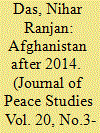

|
|
|
| 14 |
ID:
127873
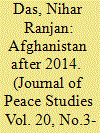

|
|
|
| 15 |
ID:
054741
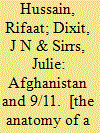

|
|
|
|
|
| Publication |
New Delhi, Roli Books, 2002.
|
| Description |
vii, 256p.hbk
|
| Standard Number |
8174362533
|
|
|
|
|
|
|
|
|
|
|
|
Copies: C:1/I:0,R:0,Q:0
Circulation
| Accession# | Call# | Current Location | Status | Policy | Location |
| 048878 | 958.1046/HUS 048878 | Main | On Shelf | General | |
|
|
|
|
| 16 |
ID:
109542
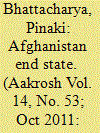

|
|
|
| 17 |
ID:
103109
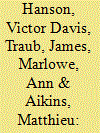

|
|
|
| 18 |
ID:
123195
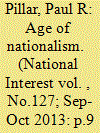

|
|
|
|
|
| Publication |
2013.
|
| Summary/Abstract |
THE URGE to apply era-defining labels to global affairs is strong and enduring. A label and a few easy-to-understand attributes associated with it can impart a reassuring simplicity to what is actually a complex and often-intractable reality. While the disadvantages of era labeling, including oversimplification, are probably as great as the advantages, the practice is here to stay.
|
|
|
|
|
|
|
|
|
|
|
|
|
|
|
|
| 19 |
ID:
106379
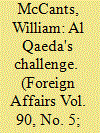

|
|
|
|
|
| Publication |
2011.
|
| Summary/Abstract |
On 9/11, the global jihadist movement burst into the world's consciousness, but a decade later, thanks in part to the Arab Spring and the killing of Osama bin Laden, it is in crisis. With Western-backed dictators falling, al Qaeda might seem closer than ever to its goal of building Islamic states. But the revolutions have empowered the group's chief rivals instead: Islamist parliamentarians, who are willing to use ballots, not bombs.This article appears in the Foreign Affairs eBook, "The U.S. vs. al Qaeda: A History of the War on Terror." Now available for purchase.
|
|
|
|
|
|
|
|
|
|
|
|
|
|
|
|
| 20 |
ID:
099899


|
|
|
|
|
| Publication |
2010.
|
| Summary/Abstract |
America won an asymmetric war in Iraq and lost an asymmetric peace. Translating material power advantage into favourable political outcomes has been a challenge for great powers down the ages-what makes this bridge even more difficult to cross today is the raised expectations on the part of liberal publics about the moral purpose of US-led interventions. In this sense, Iraq is part of the explanation for why influential liberals believe there is a 'crisis' in America's world leadership. 'America after Iraq' subjects this claim to analytical scrutiny-in particular it addresses whether Iraq was simply a chapter in a longer book detailing American power and purpose in the post-9/11 world? In answering this question the article is drawn to consider conceptual debates about a shift in the international system from anarchy to hierarchy with the US as the hegemonic power. While it rejects strong versions of the hierarchy thesis that imply the Washington is the new Rome, it is nevertheless drawn to an understanding of a hierarchical form of ordering where the US oscillates between a hegemonic role and an imperial outlaw. Seen through this lens, the Iraq War was an intervention that happened because it could, and not because it was just or necessary. Public opinion and the weakness of domestic institutions are also critical factors in explaining how it was possible for a previously status-quo oriented hegemonic power to act recklessly and put the rules and institutions of international society under strain.
|
|
|
|
|
|
|
|
|
|
|
|
|
|
|
|